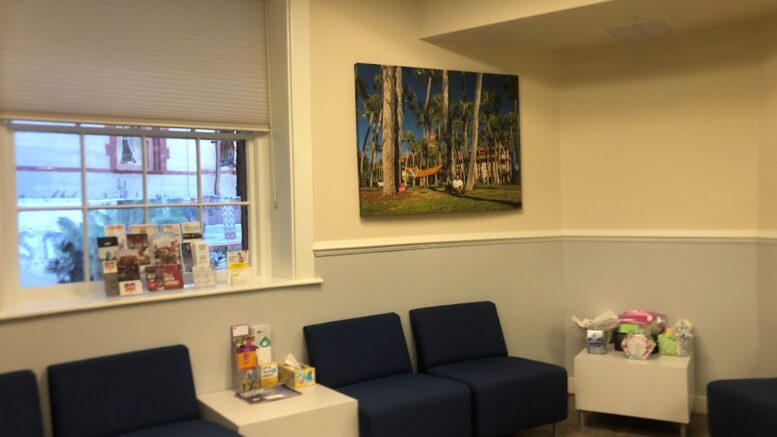By Sarah Ellis
Reproductive health has always been a heavy subject but in recent years, it has become an integral part of the cultural zeitgeist among young people, who are becoming increasingly active politically and socially.
The same political awareness permeates the female student population on the campus of Flagler College where there is an increasing concern about their reproductive freedoms. However, most are unaware of what resources are available to them on campus.
Holly Doucette, the director of Flagler College’s Department of Health and Wellness, gives some of her observations about the changes that have happened since the overturning of Roe v. Wade and Amendment No. 4, which would’ve essentially blocked the state government from stopping abortions before fetal viability, and did not pass in the state of Florida.
“There’s not as many resources as there were at one time,” Doucette said.
Though there are fewer reproductive resources available for students than there used to be, it’s important for students to be informed about what services are available so that they take advantage of the resources that are at their disposal at the Center for Health and Wellness.
“I can prescribe birth control and check IUDs. We have condoms here, and we test for STDs,” Doucette said.
“The biggest threat to students and faculty is the lack of education, and the bridge that needs to be built between student and faculty,” said Doucette. “We educate people individually a lot, as much as we can, and we tell them, ‘Share with your friends and come back and talk to us!”
Drusilla Ward is Flagler’s Center for Health and Wellness first line of defense. As the administrative assistant, Ward handles all scheduling in the nurse’s office and takes care of all administrative tasks so the nurses can do their jobs as efficiently as possible.
“From my position here, I take care of everything but the nurses’ portion of it,” Ward said.
As the first person you see when you come in and the last person you see when you come out, Ward sees a lot of students and knows how important safe spaces are for students.
“We have a lot of students that come in here for not just a medical problem but some anxiety; they’re gonna come and want to talk. They get to know the nurses, and a few of them have gotten to know me, and they’ll come in and say ‘Ms. Dru, can we talk? Or can I get a hug?’” Ward said.
Safe spaces make it so students can come in and access the reproductive services that are here for them.
“We do provide condoms; those are free. I would like you not to be ashamed if you’re going to participate in getting condoms. They’re not only for your protection but for the protection of the other person,” Ward said.
In creating that safe space Ward ensures that students’ privacy is covered to the utmost extent.
“We are HIPAA covered and certified. So what happens in here is like your Vegas for the students,” Ward said.
The Center for Health and Wellness definitely has an abundance of reproductive resources available to students. However, when speaking with the student body, there seems to be a disconnect between students and nurses.
Students really have no idea what’s happening in the nurse’s office.
Emily Backert, an art history major here at Flagler College, shares what she knows about what reproductive services are offered on campus.
“I’m not sure what that kind of thing would look like on campus,” Backert said.
Female students don’t really know that they can get prescriptions for birth control, other forms of contraceptives, pads, tampons, their IUDs checked and STD screening in the nurse’s office. This could be mainly because the only way to access that information is to go into the office and ask, but that is not necessarily the most comfortable option for female students.
“They need to start with an education or a conversation about it, ‘Here is who we are, here’s what you can talk to us about.’ Even increased social media presence for health services.” said Backert, “I never see anything about health services online.”
Cierra Robertson, a psychology major here at Flagler College, also shares how little she knows of the resources available to her when asked about what services are provided by the college at the Center of Health and Wellness.
“No, simply because I have not heard about accessibility to womens’ resources here on campus,” Robertson said.
Our male students, too, have no idea of the services available to them in the wellness center.
Shane Trangone, a business administration major at Flagler also feels the barrier between staff, students and education about reproductive health.
The male students do not feel educated nor informed about reproductive health, whether that be their own or their female counterparts.
“I don’t feel informed at all,” Trangone said.
The lack of access to reproductive education is certainly felt by Flagler’s students with most of them recounting their only sex education being health class in middle school and not knowing where to find more information.
“Nowhere at all, like health class in eighth grade and that’s about it,” Trangone said.
“I know there is a free STD test once a month at the health service but that’s it,” Trangone said.
The bottom line is that students are uninformed about the reproductive services that Flagler College offers, essentially wasting resources and putting students at risk. There needs to be an effort put forth by the college to educate and familiarize the students with the resources at their disposal in the Center for Health and Wellness.




Be the first to comment on "Reproductive Health Services Here at Flagler: What You Need to Know!"